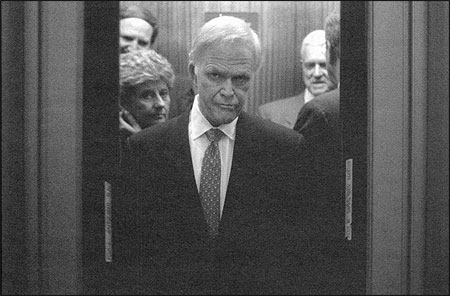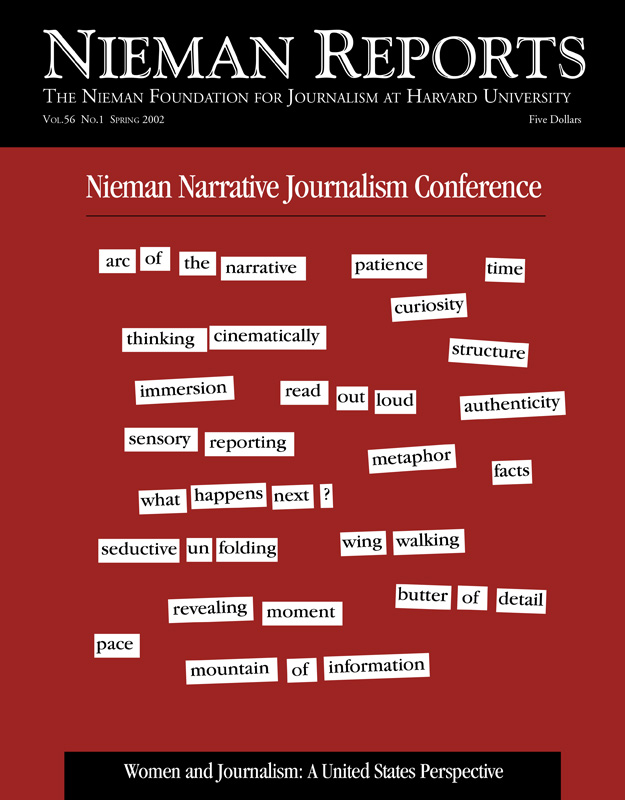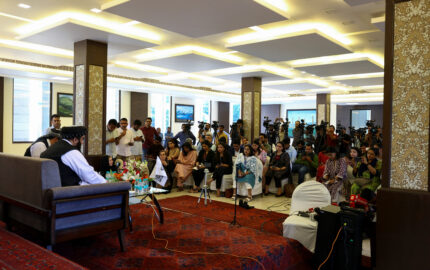
Former senator Bob Packwood catches an elevator in the Capitol a few hours after his resignation on September 7, 1995. On September 6, the Senate Select Committee on Ethics had concluded its three-year investigation into allegations of sexual and other misconduct by recommending his expulsion. Photo by Kenneth Lambert, courtesy of The Washington Times.
For some journalists—especially those with old-guard thinking—the September 11 World Trade Center attacks that led to aggressive reporting on Osama bin Laden and bioterrorism brought an oddly welcomed relief. Then Enron followed. Finally, there was a return to “real reporting,” and “important journalism.” No longer was there a focus on “tabloid stories” such as Gary Condit and the missing Chandra Levy and whatever they were doing in private that dominated some news outlets before the 11th. No more messy tales about Bill Clinton and Paula Jones or Monica Lewinsky. In their minds, at least, no more voyeuristic reporting on the so-called “private lives” of public officials.
Of course, for some media organizations, especially the supermarket tabloids and some cable news networks, there’s no question that a primary attraction in these stories was the sure-to-boost ratings combination of sex, power, fame and mystery. This is inevitable when the story involves an emotion and instinct as powerful, mysterious and easily exploited as sex. But even though the media sometimes report gratuitous stories involving sex—something I regard as unethical—we should not forget why some aspects of what for decades the press has defined as the “private lives” of public officials, when reported responsibly, are not only of legitimate public interest but also important to pursue and publish.
Unfortunately, this is not the message some influential media commentators seem to be sending. In the wake of the Monica experience, for example, historian and former presidential assistant Arthur Schlesinger, Jr. and Washington Post columnist David Broder each have warned journalists about invading the “private lives” of public officials. “[N]othing seems to bother people more about today’s journalism than the blurring of lines between the public records of candidates and their private lives,” Broder wrote. And in a New York Times op-ed, Schlesinger posited that “Reporters seem obsessively interested these days in getting candidates to tell all” about various aspects of their private lives including, he says, “their sex lives.” In arguing for tighter guidelines, he wrote that “A measure of privacy is of estimable value in protecting the stability and sanity of our public servants.”
Public officials, like private individuals, deserve a zone of privacy. On that point there is little debate. However, far too often those urging privacy suggest that all stories with a sexual angle are, by definition, about a public official’s private life. Although it perhaps should seem obvious by now, some critics still fail to fully recognize that even if an abusive sexual act is committed in private—meaning no witnesses, or in what traditionally has been considered a person’s private realm—it still may be of legitimate public concern as a potential violation of law or ethical standards. Some exhortations for privacy also suggest that the way a politician (usually these stories involve males) treats women (or men) has no relevance to his fitness for office.
Before this kind of backlash thinking takes hold, it is important to reflect on how and why perceptions about what should or shouldn’t be considered publicly relevant sexual behavior have changed during the past 30 years. It remains very rare for a journalist to ask about a politician’s truly private sex life, as it should be. However, thanks in part to the increased presence of women as both reporters and editors, particularly political journalists, media decision-makers are finally asking whether particular allegations of inappropriate or abusive sexual behavior—the kind that was well known in the past by some reporters but kept from readers and viewers—merit journalistic scrutiny. This reassessment has been part of evolving changes in society, which for centuries had been conditioned to believe—based on Aristotle’s conception of the private and public spheres—that anything involving women (considered a lesser order) or sex (even abusive sex)—belonged in the private realm. As attention increasingly has been paid to consequences of inappropriate sexual behaviors, jour-nalists—among others—have helped the public to understand that many behaviors involving sex should be considered legal or ethical matters relevant to the public interest.
Intellectually, at least, most of us now accept almost without question that rape, incest, child molestation, and child pornography are not private matters. Rape was the first abusive behavior to face legal sanction. As a society, we have been slower and more ambivalent about judging—legally or ethically—abusive behavior when it involves subtler questions concerning consent among adults.
What about a husband who forces his wife to have sex against her will? Is that a private, family matter? What about a boss who demands that his secretary have sex with him to keep her job? Is that private? What about a boss who makes repeated sexual advances to an employee but does not make any overt, explicit quid pro quo? What about a boss who has what he says is a “consensual” sexual relationship with an employee? Does that mean it is consensual? Does that mean it is ethical? What about a politician who presents himself as a happy family man and publicly promotes women’s equal rights while “privately” is a serial adulterer? What about a politician who has an affair with a young woman who later disappears without a trace?
These are the kinds of questions society—and journalists—have been grappling with over the years. It wasn’t until the early 1980’s that an increasing number of courts began to adopt feminist and legal scholar Catherine MacKinnon’s theory that sexual harassment is a form of illegal sex discrimination. Prior to that, society did not view sexual harassment as a violation of a person’s rights. The “shared narrative” said it was considered private, or “the way things are,” or perhaps a cost of being a woman in the workplace. And over time, as author Suzannah Lessard observed when writing in Newsweek about presidential candidate Gary Hart’s “Monkey Business” in 1987, “a feminist sensibility has seeped into the public consciousness…” so that even unethical behavior such as Hart’s became an issue of public concern reflecting “awareness of the dignity and equality of women.”
Anita Hill’s allegations in 1991 about inappropriate sexual remarks by Supreme Court nominee Clarence Thomas came five years after the 1986 landmark U.S. Supreme Court decision in Meritor Savings Bank v. Vinson established that even a “hostile workplace” (not just quid pro quo harassment) could be illegal sexual harassment. This decision led U.S. companies to create major new guidelines and training programs for employees. Even so, much of the press and the Congress seemed unaware that sexual harrassment was a significant problem for women in the workplace. As Geneva Overholser, then with The Washington Post Writers Group observed, “Women’s reporting” made the Thomas-Hill story about allegations of unethical conduct “the story it was.” In fact, “I don’t think it would have been that story if men had been the only ones in those political reporting positions,” she told Columbia Journalism Review.
Following the Thomas-Hill hearings, the general problem of sexual harassment on Capitol Hill—known to many Washington reporters—seemed to me like the most obvious follow-up story. At the time, I wondered why no major news organizations were doing it. Working as a freelance journalist, I began months of reporting to confirm the Senator Bob Packwood story, most of the time in despair, fearing it would never be published. I am pretty certain that, pre-Anita Hill, no major newspaper would have published it.
Even post-Anita Hill, I had trouble finding a news organization willing to take it on before I finally decided to approach The Washington Post, which eventually agreed to pursue it. Others I’d approached told me they didn’t consider it “a story.” If it was a story, a major newspaper would have done it already, or so the thinking went. Some media brass still considered it a story “about sex,” about Packwood’s private life, instead of about abuse of power that involved sexual misconduct rather than financial or some other misconduct traditionally deemed relevant to the public interest.
After the Packwood story—a story of repeated sexual misconduct by the senator over many years—was published in 1992, political pundits and prominent journalists acknowledged there had been rumors about Packwood suggesting this behavior for years. Apparently none had bothered to follow up sufficiently. One reason might have been the prevalent shared narrative that sexual favors were a perk of the powerful. This sense of privilege was reinforced by the fact that Congress had exempted itself from most workplace laws—including sexual harassment—that it had passed for employers in the rest of the country. (This exemption disappeared for senators after the Packwood case, when the Senate adopted the Congressional Accountability Act of 1995.)
Or perhaps journalists had internalized some editors’ attitudes. For example, when we were guests on National Public Radio’s “On the Media” program in 1994, Martin Tolchin, who was then one of The New York Times’ top Washington reporters, observed that his paper would have been very reluctant to pursue the story of Senator Packwood’s predatory sexual behavior. He explained that stories involving sex made editors “skittish.” And in Tolchin’s new book, “Glass Houses: Congressional Ethics and the Politics of Venom,” co-authored with his wife, Susan J. Tolchin, they argue that one of the senator’s diary entries, suggesting professional misconduct in soliciting work for his estranged wife from a lobbyist, “was much more damaging” than the charges of sexual misconduct. Their reasoning: “because the allegation involved the more serious charge of using public office for private gain.”
I disagreed with this old-school reasoning when I began working on the story. I believed this was a story about human rights, injustice and serious abuse of public office for private gain. Even though the media often downplayed—sometimes even trivialized—the profound consequences Packwood’s behavior caused many of his victims, I knew there were serious repercussions for several women who not only had been humiliated, scared or degraded, but also professionally or financially ruined. Some quit their jobs—uprooting their families or taking lower-paying work—because of Packwood’s persistent unwelcomed advances.
Our reporting identified more than 40 women whose lives had been negatively affected by the Senator’s actions. Seventeen chose to testify during the subsequent Senate Select Committee on Ethics investigation, and several said they’d been terrified by his advances. Some allegations were tantamount to sexual assault. For the first publicly known time, the committee considered sexual misconduct allegations as a violation of the Senate’s ethics standards. Although the media repeatedly referred to Packwood’s behavior as “sexual harassment,” the committee avoided using such legal terms and instead made the same distinction we made in our Post stories by using the broader term “sexual misconduct.” The issue was not whether Packwood’s conduct met a legal standard for harassment or sexual assault (in fact, the statute of limitations had passed on the reported incidents). At issue was abuse of power, an ethical issue.
The committee concluded in its 1995 report that Packwood had “engaged in a pattern of sexual misconduct between 1969 and 1990” that brought “discredit and dishonor upon the Senate” resulting in “conduct unbecoming a Senator.” The committee’s report concluded that “these incidents, taken collectively, reflect a pattern of abuse by Senator Packwood of his position of power over women who were in a subordinate position, either as his employees, as Senate employees, prospective employees, campaign workers, or persons whose livelihood prevented them from effectively protesting or seeking redress for his actions. These women were not on an equal footing with Senator Packwood, and he took advantage of that disparity to visit upon them uninvited and unwelcome sexual advances, some of which constituted serious assaultive behavior, but all of which constituted an abuse of his position of power and authority as a United States Senator.”
This was a groundbreaking decision not only because it recognized sexual misconduct as an ethical issue for senators, but also because it recognized that abuse of power, in a case like this, could extend beyond women in the workplace to, for example, conduct with a hotel worker, a waitress, or a babysitter. The committee, whose members and staff included high-ranking women, also set an historic precedent by making no distinction in gravity among the three abuses of power they charged him with—sexual misconduct, obstructing the investigation by altering his diaries (evidence), and linking personal financial gain to his official position when soliciting jobs for his wife. (The other two abuses of power were uncovered during the Senate’s investigation of the sexual misconduct allegations.) The committee voted unanimously to recommend his expulsion from the Senate.
Despite this widely publicized, unprecedented official articulation of an ethical standard involving politicians, much of the mainstream media, especially those at more prestigious publications, still seem skittish about reporting stories that involve questionable sexual behavior by public officials, especially when there is no clear violation of law. This reluctance was reflected by then New York Times executive editor Joseph Lelyveld in a 2001 Times article by Felicity Barringer. She concluded that the story about Representative Gary Condit and the missing Chandra Levy “shows that the press can have legitimate reasons for opening the door to a private life,” especially when someone’s life or safety is at stake. She also noted her paper’s mostly low-key coverage of the story and quoted Lelyveld as saying, “We do our best not to be dragged into a consideration of the sex lives of people public or private.” “However,” he added, “there are certainly legitimate questions about whether he has been forthcoming and helpful in the search for this woman whom he obviously knew well.”
His words caught my attention. Was he saying that the Times makes every effort to avoid stories involving rape, sexual harassment, battering or incest? Presumably Lelyveld, who did not return my phone call seeking clarification, would respond that that isn’t what he meant and that, of course, the Times does cover those kinds of stories.
However, some journalists continue to be confused about what the real public issues are when stories involve politicians and abusive sexual behavior. Consider two of numerous examples in which journalists say—erroneously—that high-profile stories involving politicians and sex focused on their private lives. In a 1999 New Republic article, Peter Beinart referred to articles about Gary Hart, Clarence Thomas, and Bob Packwood as “groundbreaking investigations into politicians’ personal lives.” Writing in these pages about Packwood in 1994, Patrick Yack, then editor of The News & Record in Greensboro, North Carolina, noted that “Americans genuinely dislike the notion that the press…is snooping into the private lives of politicians” (my italics in both examples).
In concluding his New York Times op-ed, Arthur Schlesinger tried to bolster his case by citing the oft-quoted remark about privacy made by Justice Louis D. Brandeis in a 1928 Supreme Court dissenting opinion. He wrote that the creators of the Constitution conferred on Americans “the right to be let alone—the most comprehensive of the rights of man and the right most valued by civilized men.”
But what about “civilized women”? Don’t they have a right to be let alone, too?
In an 1890 Harvard Law Review article, Brandeis (writing before he joined the court) and Samuel D. Warren condemned the press for “overstepping in every direction the obvious bounds of propriety and of decency” by publishing “gossip,” such as “details of sexual relations,” to “satisfy a prurient taste.” Commentators often cite this passage as they urge journalists to keep their notebooks away from public officials’ private lives.
But in this article, Brandeis and Warren—who were agonizing then about the dangers of the newly developed camera—actually argue for a very broad standard when it comes to reporting on political people, one that continues to make sense now, more than a century later. They wrote that “in varying degrees,” political figures “have renounced the right to live their lives screened from public observation” and assert that the right to privacy Americans cherish should not keep the public from learning information—especially about those serving in the political sphere—that is “of public or general interest.” They thought this usually should include information that has a “legitimate relation to or bearing upon any act” by an individual “in a public or quasi public capacity” or that has “a legitimate connection with” a person’s “fitness for a public office” or for “any public or quasi public position” that a person seeks “or for which he is suggested.” They fully acknowledged that many judgments would be somewhat subjective but necessary.
Applying their principles depends on your definition of “legitimate.” Fortunately, over time, especially as more women have entered journalism, the definition—like the definition of news—has been evolving and maturing. And after hundreds of years of being irrelevant to society’s evaluation of a politician’s character or competence, sexual misconduct gradually has become considered, at a minimum, a relevant factor.
But because sex is a highly charged issue, traditionally considered a strictly personal or private subject, even an unquestionable “right,” some women believed they risked their careers by urging mostly male editors to reconsider conventional definitions of private sexual behavior. Several women journalists tell me this continues to be a challenge in some newsrooms today.
Florence George Graves, a resident scholar at Brandeis University Women’s Studies Research Center and the founder of Common Cause Magazine, broke with Charles E. Shepard (Nieman Fellow 1991) the Senator Bob Packwood sexual misconduct story for The Washington Post. Her research on the public/private dichotomy in politics and in the media has been supported in part by an Alicia Patterson fellowship, a Pope Foundation Journalism Award, and a Goldsmith Research Award from Harvard University’s Shorenstein Center on the Press, Politics and Public Policy. Some portions of this article were published in the Radcliffe Quarterly.



